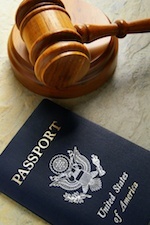
If a person is arrested or convicted of driving under the influence (DUI), one result is that he/she could be disqualified from global entry into United States airports.
Global entry is a program of the U.S. Customs and Border Protection service (“CBP”). It allows certain travelers to receive expedited clearance once they arrive at certain U.S. airports.
A DUI arrest and a DUI conviction appear on a person’s criminal record. Once personnel from CBP view this information on a person’s record, they may use it as grounds to disqualify a person from the global entry program.
This may even be the case if a person has a DUI conviction expunged or dismissed.
1. How does a DUI affect a person’s global entry status?
As stated above, global entry allows expedited or quickened clearance for pre-approved, low-risk travelers upon entry into certain U.S. airports. As of October 2017, global entry was available at 54 U.S. airports; and more than 1.8 million people were enrolled in the program. CBP receives approximately 50,000 new applications for the program every month.1
If a person is arrested for DUI or convicted of the offense, then one result is that he/she could be disqualified from the global entry program. This is because a person can be disqualified from the program if he has a criminal record.
Please note that an arrest for DUI, or a conviction of the same, gets reported to the California Department of Justice (“CDOJ”).
The information then gets recorded onto a person’s criminal record, and the CDOJ also enters the information into national databases.
Agents from CBP will search these databases when reviewing a person’s global entry application or application renewal. If the agents see a DUI arrest or a DUI conviction in the databases, they can use this information to cancel or prohibit global entry status.
2. Will expungement help global entry?
No. Some people can get a DUI offense expunged. Expungement is a court-ordered process in which the legal record of an arrest or a criminal conviction is sealed or dismissed under the law.2
While expungement may remove evidence of a DUI arrest or conviction from a person’s criminal record, the expungement is not always communicated to the CDOJ.
If not communicated, this means CBP personnel will still see an arrest/conviction on a person’s record and could use it to cancel or prohibit global entry status.
3. What are California Vehicle Code 23152a and 23152b VC?
California Vehicle Code 23152a is the California statute that makes it a crime for a person to operate a motor vehicle while under the influence of alcohol. “Under the influence” means that a person’s physical or mental abilities are impaired to the extent that he/she can no longer drive as well as a cautious sober person.3
California Vehicle Code 23152b also makes it a crime to drive while intoxicated. The statute sets forth the “per se” definition of DUI and states that a person is guilty of DUI if driving with a blood alcohol content (BAC) of 0.08% or higher.4
4. What are some other penalties for a California DUI?
In California, people convicted of DUI will face other penalties besides possible disqualification from the global entry program.
First, second, and third DUI offense charges are prosecuted as misdemeanors in California.
Penalties for a DUI conviction may include:
- misdemeanor probation,
- fines,
- DUI school,
- a driver’s license suspension,
- jail time, and
- a requirement of installing an ignition interlock device on the offender’s vehicle.
Legal References:
-
- For more information on the global entry program, see the CBP website, “Global Entry.”
- California Penal Code 1203.4 PC.
- California Jury Instructions, CALCRIM No. 2110. See also People v. Enriquez (1996) 42 Cal.App.4th 661.
- California Jury Instructions, CALCRIM no. 2111.

